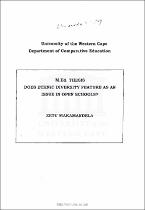| dc.contributor.advisor | Kruss, Glenda | |
| dc.contributor.author | Makamandela, Zetu | |
| dc.date.accessioned | 2023-07-11T13:27:42Z | |
| dc.date.available | 2023-07-11T13:27:42Z | |
| dc.date.issued | 1998 | |
| dc.identifier.uri | http://hdl.handle.net/11394/10365 | |
| dc.description | Magister Educationis - MEd | en_US |
| dc.description.abstract | There is more to the phrase "South African schools belong to all South African children". While it sounds simple and true there is more to it in the case of the schools which once excluded other race groups under the principle of apartheid rule. Opening of schools means coming together of children, teachers and parents from different socio-economic, cultural and racial backgrounds. (While my focus is on the students and student-teacher relationships what this means for the parents is no less significant) What happens then? Do these groups embrace one another regardless of their diverse background and orientation? Do teachers automatically cope with this diverse audience, do something to facilitate a supportive environment to all, or are things merely left to chance? On the other hand, if the school recognises diversity as an issue that should be treated strategically for the well-being of all those involved, what are the mechanisms in place to help both the learners and teachers cope with the new environment? | en_US |
| dc.language.iso | en | en_US |
| dc.publisher | University of Western Cape | en_US |
| dc.subject | Race | en_US |
| dc.subject | Open schools | en_US |
| dc.subject | South Africa | en_US |
| dc.subject | Ethnic | en_US |
| dc.subject | Society | en_US |
| dc.title | Does ethnic diversity feature as an issue in open schools? | en_US |
| dc.rights.holder | University of Western Cape | en_US |

